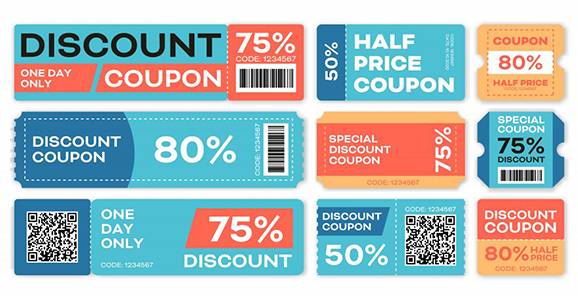Whether you go shopping frequently or occasionally, you still try to find ways to save some money, right?
Well, then it's likely that you've come across phrases like discounts, coupons, and vouchers. But, wait right there, you think they all are the same? That’s not true! Although they all are introduced in the market to attract customers by promise savings, they all differ in certain aspects.
In 2023, 92.3% of all digital coupon users are to be smartphone coupon users. That number is estimated to increase to 93.8% in 2026. So, don’t even dare to underestimate the power of coupons.
Think of coupons as your secret discount passcodes, discounts as your reliable slash prices, and vouchers as your golden ticket to exclusive deals.
However, this was just to give you an overview, let's explore more about these terms and as customers how we can benefit from each of them!
What is the Basic Difference Between Coupons and Vouchers?
1. Coupons:
For most of us, encountering the term "coupon" while shopping is fairly common! 93% of coupon users are very likely to use coupons or discounts they receive via email. But, what are coupons actually?
Coupons are little tickets (digital or in paper form) that let us make savings on ‘specific product purchases or orders.’ They are used by businesses to offer discounts, draw in new clients, and increase sales when business is slow.
This is why coupons have always been the top techniques adopted by companies to boost sales because almost 70% of consumers love receiving coupons and not only this, 66% of consumers say they would make a purchase if they had a coupon, regardless of whether they initially planned to buy something.
Coupon Types
- Manufacturer coupons: They are offered by the companies that produce the goods to increase sales.
- Store coupons: They are offered by physical and online retailers to drive customers in.
Occasionally, you can maximize your savings by combining a manufacturer's and store coupon. "Coupon stacking" is the name of this technique, which can significantly reduce costs.
2. Vouchers:
A voucher is a unique payment method, which is primarily used for online purchases. You pay the full amount of your purchase with a voucher code rather than a credit or debit card. It covers the entire cost or provides a discount on the total amount instead of applying to a specific product.
Usually, vouchers are digital codes that you can access on the website or receive through email. Although physical vouchers may be used occasionally, they are less typical for online transactions.
Nonetheless, companies might occasionally provide printable vouchers too! These are vouchers that you can print off of their website by downloading them. Next, you either enter the voucher code while checking out or show the printed voucher at the store.
Voucher Types
- Gift Vouchers: These can be used to make purchases instead of cash and are similar to prepaid cards for particular retailers.
- Travel or meal vouchers: These provide you with savings on specific services, such as meals or travel.
How do Coupon Codes Work?
Coupon codes are digital or alphanumeric sequences that companies give their customers to qualify them for special offers or discounts when they make purchases. To apply the discount, these codes are usually entered during the online checkout process or shown at physical stores.
Moreover, according to one of the research, online and mobile coupon codes are not just appreciated by the age group 18-34 but people aged above 55 are also utilizing coupons. Here is an example to help you understand;
Example:
There is a coupon that gives you a 20% discount on veggie burgers. Now, this means you can only use it on veggie burgers and no other item you are going to order from that restaurant’s menu. You need to enter that coupon code during the online checkout process to obtain the coupon.
Pros and Cons of Coupon Codes
Pros:
- Saving Money: Over time, using coupons results in less spending, which builds up.
- Attracting New Customers: Businesses can attract new customers and encourage repeat business by providing coupons.
Cons:
- Business Risks: Businesses stand to lose a lot of money if coupons are used improperly.
- Customer Loyalty: Businesses may have fewer devoted customers when individuals simply jump at the chance to get a good deal and leave.
How do Voucher Codes Work?
With the surge in online shopping, vouchers have gained immense popularity. A study conducted by Statista revealed that 58% of consumers in the United States used digital vouchers while making online purchases in 2020. This trend showcases the value consumers place on voucher-based promotions and discounts.
Like coupon codes, voucher codes are also alphanumeric sequences that companies give to their customers. During online transactions, these codes are used as a discount or payment method, mostly for online purchases (sometimes physically too). Make sure to use them before their expiry date ends!
For Example:
You just received a $70 off voucher via mail from your favorite makeup store, which means you can buy anything from their collection and you will get $70 off on your final amount.
Note that the vouchers can offer discount in direct amount or percentage. A percentage discount is more appealing to consumers for items under $100 while a dollar-off discount works better for items priced over $100.
Pros and Cons of Voucher Codes
Pros:
- Ideal Gifts: Because they allow recipients to select what they want, vouchers make wonderful gifts.
Cons:
- Limitations: Certain coupons come with a lot of restrictions, such as being available only during specific hours or not being combined with other deals.
Coupon vs Voucher vs Discount: Identifying the Primary Differences
1. Coupons vs Vouchers
Businesses frequently use coupons and vouchers in the world of discounts and promotions, using promo codes to give customers deals. It can be confusing to determine which approach—vouchers or coupons—is best for your company.
2. Coupon: Customer-Friendly Offers
Coupons are similar to magical savings tickets! These are small pieces of paper that give you discounts on particular products. They may be waiting to be printed in your mailbox or even online as they exist in two forms; digital and physical. Depending on the manufacturer, it can function once or more than once, before the expiry date.
Furthermore, coupons are an excellent way to save money on individual purchases, as 80% people admit they’d try a new brand if it offered them a discount, thus this gives an edge to companies who want the audience to test out new goods or brands without going over budget.
3. Voucher: Flexible Discounts
Like digital gift cards, vouchers can be obtained through loyalty programs or sent directly to your email. They may encourage you to return by offering one-time discounts or operating on a "use as you go" basis, in contrast to coupons. Gift cards are adaptable, meeting a range of purposes from rewarding usage to promoting recurring business.
The Comparison Chart
Businesses can effectively personalize their promotions to their customer base and goals by knowing the differences between coupons and vouchers.
Whether you're trying to attract new clients or reward existing ones, picking the appropriate approach can help to increase engagement and enhance client loyalty.
|
Factors |
Coupons |
Vouchers |
|
Payment |
Related to Payment |
Not Related to Payment |
|
Specificity |
Can be used by everyone |
Specifically for Individuals |
|
Usage |
Used at checkout |
Used during a login session |
|
Redemption |
Can be used one or multiple times (depending on the manufacturer) |
One-time use only. |
Vouchers vs Discount
Another tactic used alongside Voucher is the Discount Codes by the competitive markets. The “Discounts and offers” are cited as important shopping decision factors by 93% of US shoppers.
Though both the terms are used interchangeably, while fulfilling different roles, each one advances the general objective of raising client happiness and loyalty.
Vouchers: Reward Loyalty
Mostly in virtual form gift cards and loyalty cards are examples of vouchers that immediately thank people for their support. As said earlier, vouchers sometimes could exist in physical form and they can be exchanged for savings, gifts, or additional balances, promoting recurring business and creating enduring connections with customers.
Discount Codes: The Easy Way to Save Money Online
Alphanumeric sequences known as discount codes are frequently provided digitally and are used to unlock discounts when checking out online.
As much as 80% of shoppers are willing to “go out of their way” to find the best deal and 40% of them feel “smart” when they find the best offers in the form of discount codes. Therefore, customers can easily save money on what they buy online due to their streamlining of the discount process.
The Comparison Chart
|
Factors |
Vouchers |
Discount Codes |
|
Distribution |
Directly from companies to customer |
Send Digitally only |
|
Form |
Gift cards, loyalty cards (can be in physical or digital form) |
Alphanumeric sequences |
|
Redemption |
Can be redeemed/used in stores or during online checkout. |
Can be used only at online checkout |
|
Purpose |
Increase repeat purchases |
Streamline online discount process |
Coupon vs Discount
Now, that we have discussed all three of the terms, you might be wondering, ‘Is coupon code a discount code then?’ well, there lies a subtle difference between them;
Though, offering discounts to customers is the primary goal of both coupons and discount codes; there is a slight key difference in their format and methods of redemption which differentiates the two marketing tactics.
The discount codes are specifically alphanumeric codes used during online transactions only, while coupons can be printed cards or digital versions that can be used by the customer either at the store physically or during online purchases!
However, as per some studies in the US, people prefer coupons over discount codes because they think that a brand offers discounts only when they need to clear the stock or they speculate on the product quality. Therefore, coupons are perceived as more reliable and transparent.
Conclusion
To sum it up, a voucher is a special piece of paper or a digital message that indicates you have a specific amount of money to spend or an exclusive offer to take advantage of. It functions similarly to a gift card for a particular business or service.
On the other hand, when you purchase something, a coupon works more like a ticket or a secret code that lowers the price only on a specific product it is valid for. And, then comes the discount code which is just simply applied via an alphanumeric code.
Thus, now that we have clearly stated what each term specifies, we hope that you benefit from these distinctions to better understand how to shop around, get the best deals, and save a few bucks!


